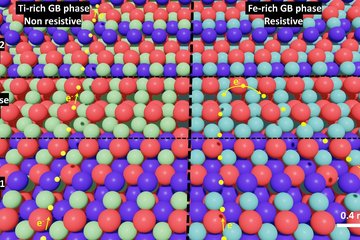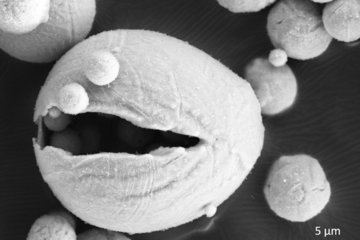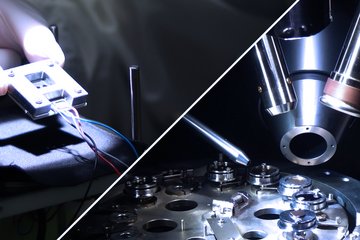All genres
21.
Journal Article
Ab Initio Determined Phase Diagram of Clean and Solvated Muscovite Mica Surfaces. Langmuir 32 (4), pp. 1027 - 1033 (2016)
22.
Journal Article
A first principles investigation of zine induced embrittlement at grain boundaries in bcc iron. Acta Materialia 90, pp. 69 - 76 (2015)
23.
Journal Article
Connecting semiconductor defect chemistry with electrochemistry: Impact of the electrolyte on the formation and concentration of point defects in ZnO. Surface Science 631, pp. 190 - 195 (2015)
24.
Journal Article
Identification of bulk oxide defects in an electrochemical environment. Faraday Discussions 180, pp. 97 - 112 (2015)
25.
Journal Article
Negatively charged ions on Mg(0001) surfaces: Appearance and origin of attractive adsorbate-adsorbate interactions. Physical Review Letters 113 (13), 136102 (2014)
26.
Journal Article
Extending the concept of defect chemistry from semiconductor physics to electrochemistry. Physical Review Applied 1 (1), 014001 (2014)
27.
Journal Article
Hydrogen Adsorption on polar ZnO(0001)–Zn: Extending equilibrium surface phase diagrams to kinetically stabilized structures. Physical Review B 82 (16), 165418 (2010)
28.
Journal Article
Temperature Stabilized reconstructions at polar ZnO(0001). Physical Review Letters 103 (6), 065502 (2009)
29.
Journal Article
Nitrogen adsorption and thin surface nitrides on Cu(111) from first-principles. Surface Science 601, pp. 4775 - 4785 (2007)
30.
Book Chapter
Handling Time and Temperature in Materials Simulation. In: Characterization of Materials, 2nd Edition (Ed. Kaufman, E. N.). WILEY (2012)
31.
Meeting Abstract
Impact of the vapour pressure of water on the equilibrium shape of ZnO nanoparticles: An ab-initio study. In APS March Meeting 2014, abstract #Q2.009. APS March Meeting 2014 , Denver, CO, USA, March 03, 2014 - March 07, 2014. (2014)
32.
Meeting Abstract
Impact of the vapour pressure of water on the equilibrium shape of ZnO nanoparticles: An ab-initio study. In DPG Spring Meeting 2014, Abstract: O50.6. DPG Spring Meeting 2014 , Dresden, Germany, March 30, 2014 - April 04, 2015. (2014)
33.
Talk
In-situ insights into interfacial processes at reactive liquid-solid interface during magnesium corrosion using cryo-atom probe tomography. EuroMat 2025 conference, Granada, Spain (2025)
34.
Talk
New insights into the reactive liquid-solid interface during magnesium corrosion using cryo-atom probe tomography. EUROCORR 2025 Annular Congress of the European Federation of Corrosion, Stavanger, Norway (2025)
35.
Talk
Atomic insights into fundamental processes at electrochemical solid/liquid interface by ab initio calculations. 38th Topical Meeting of the International Society of Electrochemistry: Nanomaterials in Electrochemistry, Manchester, UK (2024)
36.
Talk
Advancing Electrochemical Insights: Ab Initio Control and Realistic Description of Solid-Liquid Interfaces. 11th International Conference on Multiscale Materials Modeling, Prague, Czech Republic (2024)
37.
Talk
Materials design and discovery in high-dimensional chemical and structural configuration spaces. Psi-k 2020 Conference, Lausanne, Switzerland (2024)
38.
Talk
Challenges in developing machine learning potentials for fully explicit modeling of solid-liquid electrochemical interfaces. CECAM Workshop "Machine Learning Potentials: From Interfaces to Solution", Ruhr-University-Bochum, Bochum, Germany (2024)
39.
Talk
Advancing Electrochemical Insights: Ab Initio Control and Realistic Description of Solid-Liquid Interfaces. 75th ISE Annual Meeting, Montreal, CA, USA (2024)
40.
Talk
Insights into stability, reactivity and degradation of electrified solid/liquid interfaces from ab initio calculations. Lorenz Workshop on "Multiscale modeling of electrochemical processes", Leiden, The Netherlands (2024)











